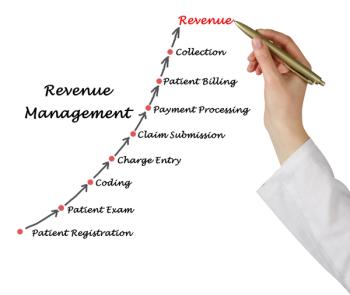
Revenue Cycle Management
Latest News
Latest Videos

Shorts

Podcasts
CME Content
More News

A new survey from Smarter Technologies and MedCity News shows hospitals and practices waiting months for payment, battling costly billing software and turning to AI for relief.

Explore these essential financial indicators and strategies for successfully expanding your medical practice while avoiding common pitfalls.

At the MGMA Leaders Conference 2025 in Orlando, speakers outlined how “agentic AI” — adaptive, goal-driven automation — could transform revenue cycle workflows, from prior authorizations to collections, while cautioning practices to separate real solutions from hype.

How to partner to drive better patient outcomes and control costs

Brian Hall, VP of sales strategy at Veradigm, explains how practices can boost revenue by focusing on a few high-impact KPIs — and getting the whole team aligned on what really drives cash flow.

Practical, proven billing improvements — from front-desk diligence to denial prevention — that keep cash flow steady and your revenue cycle running smoothly.

Enhance patient access with RCM strategies: streamline workflows, leverage AI, and prioritize technology to improve care delivery and operational efficiency.

How small practices can turn claim denials into faster payments, smarter workflows and long-term financial stability.

A discussion with Plante Moran’s Tammy Schaeffer about why value-based care hasn’t been adopted more quickly

Balancing the ledger and the mission with up-front payment solutions strengthens access and revenue.

AdvancedMD survey shows financial health is top of mind as practices eye payer renegotiations, service expansion and staffing boosts.

Optimizing revenue cycle management for mental health providers, and how primary care physicians can help bridge the gap.

From tightening front-end processes to leveraging the right tech, these practical tips help small practices boost collections and reduce administrative headaches.

GI Alliance partners with IKS Health to enhance revenue-cycle management with AI, streamlining operations for over 900 gastroenterologists nationwide.

Physicians can enhance cash flow and practice profitability by mastering claims management, addressing denials, and optimizing revenue cycle processes for better patient care.

Automation has emerged as a key strategy for improving revenue cycle efficiency and reducing costs.

Errors in coding, delayed claim submissions, or ineffective patient collections can result in significant revenue losses, impacting a practice’s ability to invest in staff, technology, and patient care.

The risks you need to understand about revenue cycle management compliance

While often seen as a normal cost of doing business, denials impact not only the provider's revenue cycle but also patient care, which is why the amount of money left on the table is hard to ignore.

Yale researchers revealed $2.6 trillion in payouts over two decades, raising concerns about affordability and reinvestment.

Rising costs can put financial pressure on medical practices, potentially resulting in challenges like payroll delays and operational setbacks. These tips can help.

As patient expectations shift toward an expectation of on-demand health care, urgent care centers must adapt their revenue cycle processes to stay competitive and ensure financial stability.

If providers invest in the right technologies, they are well positioned to reduce denials, cost to collect and labor costs, accelerate cash flow, and deliver a better patient experience.

Debunking common misconceptions about IRS section 179 for doctors' offices

Insurers are using AI to deny claims – so isn’t it time to start using AI to get them approved?










